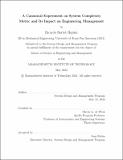| dc.contributor.advisor | de Weck, Olivier L. | |
| dc.contributor.author | Bortot Hopker, Ricardo | |
| dc.date.accessioned | 2022-08-29T16:05:48Z | |
| dc.date.available | 2022-08-29T16:05:48Z | |
| dc.date.issued | 2022-05 | |
| dc.date.submitted | 2022-06-28T20:26:52.606Z | |
| dc.identifier.uri | https://hdl.handle.net/1721.1/144701 | |
| dc.description.abstract | Systems are constantly increasing complexity. Being able to quantify the system complexity and how it relates to human effort and cognition can bring numerous benefits for product development and project management. In this thesis, 25 people were part of an experiment using the travel salesperson problem, they completed 13 problems each with varying complexity. The results were summarized and through a series of statistical analysis it was found that the human effort scales super-linear with complexity in the form e = AC {superscript 1.47} + d, where A and d are constants. Additionally, based on the results in this study and previous, it is proposed an objective function for optimization of system architecture decomposition which uses the heuristics learned to reduce the human effort to understand the system. | |
| dc.publisher | Massachusetts Institute of Technology | |
| dc.rights | In Copyright - Educational Use Permitted | |
| dc.rights | Copyright MIT | |
| dc.rights.uri | http://rightsstatements.org/page/InC-EDU/1.0/ | |
| dc.title | A Canonical Experiment on System Complexity Metric and Its Impact on Engineering Management | |
| dc.type | Thesis | |
| dc.description.degree | S.M. | |
| dc.contributor.department | System Design and Management Program. | |
| dc.identifier.orcid | https://orcid.org/0000-0003-2445-5774 | |
| mit.thesis.degree | Master | |
| thesis.degree.name | Master of Science in Engineering and Management | |
